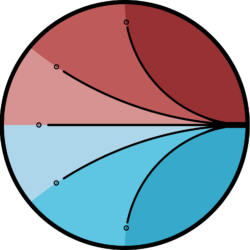We are pleased to confirm the following speakers in the Data-driven Science by Data Science session, on June 2 from 11:00-12:30 CET:
Bio: Professor in Augmented Reality and Virtual Reality at the Visualization Research Center, University of Stuttgart.
Title: Understanding Data: A Quest for Human-Machine Collaboration
Abstract: Working with and leveraging data has become one of the main pillars of modern science, industry, and society. With the advent of learning-based approaches, there has been a strong focus on how this data can be used to fully automatize certain problems. While full automatization is easy to communicate in the media, the contemporary rhetoric seems to forget that most data problems will continue to necessitate meaningful interfaces and cooperations between humans and machines. Our work focuses on these interfaces, and we seek solutions that help people work with and understand their data by combining approaches from data visualization, human-computer interaction, and computational analysis. In this talk, we will look at different examples of such human-data interfaces, and discuss a model that could help us to characterize the problem space between full automation and human-in-the loop approaches.
Bio: Professor at the Department of Information Science and Media Studies and Director of the Centre for the Science of Learning & Technology (SLATE), University of Bergen
Title: Learning Analytics to Support Learning, Teaching and Educational Practice
Abstract: Learning Analytics (LA) has emerged over the past 11 years as a promising field of research and domain of practice. With roots in AI in Education, Educational Data Mining (EDM), and Big Data, the field comprises research into the challenges of collecting, analysing and reporting data with the specific intent to improve learning and the contexts in which it occurs. Placing the needs of the human in the centre is necessary to impact practice. In this talk I will introduce the field of learning analytics and present results from projects in both the school and higher education sectors.
Bio: Professor at the Department of Information Science and Media Studies and Director of the Research Centre for Responsible Media Technology and Innovation – SFI MediaFutures, University of Bergen
Title: Data Science on the Web for Better Food Decision Making
Abstract: According to the World Health Organization around 80% of cases of heart disease, strokes and type 2 diabetes could be avoided if people were to implement a healthier diet. Computational data analytics approaches have been touted as a valuable asset in achieving the ambitious goal of understanding user behavior and being able to develop intelligent online systems, which can positively influence people’s food choices. In this talk, I will present our research on data science approaches to understand, predict and potentially change food decision making in an online context. First, I will show to what extent online food interactions can be linked to real-world health issues such as obesity on a large-scale. After that, I will show how people upload, bookmark or rate online recipes in large online food communities and how contextual factors and biases such as seasonality, temporality, social context or presentation of recipes have an impact on popularity and how they are perceived. Furthermore, I will reveal to what extent these factors and biases can be exploited to model and predict the users’ online food choices. To conclude, I will present some preliminary work aiming to nudge people towards food choices.
